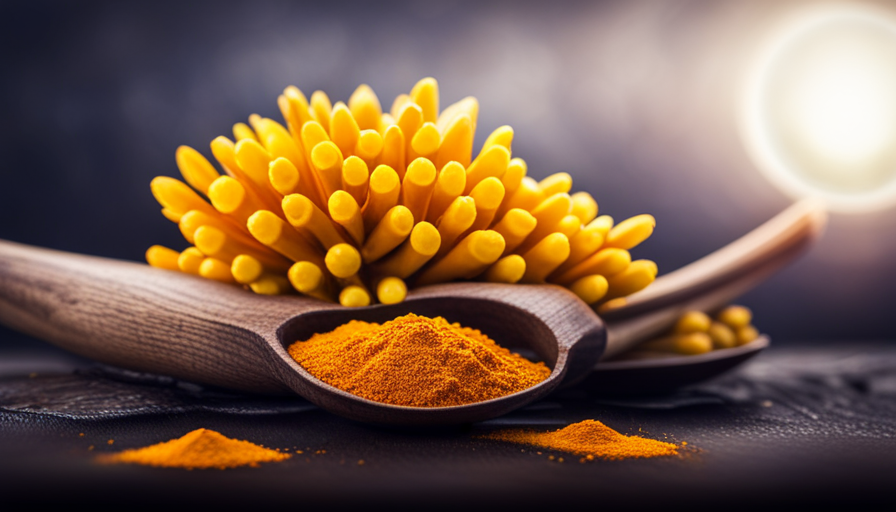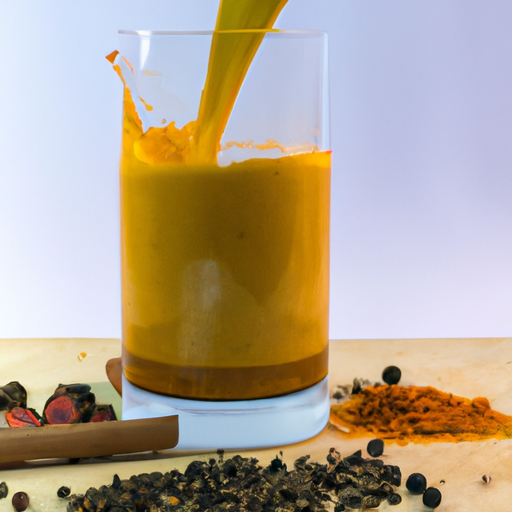Imagine a warm, golden elixir, swirling with potent healing properties. Just one sip and you can feel its soothing touch, like a gentle breeze caressing your body.
This miraculous concoction is none other than turmeric tea, a beverage that has been cherished for centuries for its remarkable health benefits. But what is the secret behind its power? What is the active ingredient that makes turmeric tea a true elixir of wellness?
In this article, we will delve into the depths of turmeric tea and uncover its active compound, the key to its healing prowess. This golden gem is known as curcumin, a bioactive substance that gives turmeric its vibrant yellow color. But curcumin is not just a pretty pigment – it is a powerhouse of health benefits.
Join me on a journey as we explore the medicinal properties of curcumin and discover why turmeric tea has become a beloved elixir for those seeking relief from inflammation, improved digestion, and a boost to their overall well-being.
So, grab your mug, steep a cup of turmeric tea, and let’s embark on this enlightening adventure together.
Key Takeaways
- The active ingredient in turmeric tea is curcumin.
- Curcumin is a bioactive substance with numerous health benefits.
- Turmeric tea has been used for centuries in traditional Ayurvedic medicine.
- Curcumin has potential anti-cancer properties and can enhance brain function and mood.
The Origins of Turmeric Tea
Discover the fascinating origins of turmeric tea and how it can enrich your daily routine. The history of turmeric tea dates back thousands of years, originating in ancient India. Turmeric, scientifically known as Curcuma longa, has been used in traditional Ayurvedic medicine for its numerous health benefits. In fact, it’s been revered as a sacred spice and is often referred to as ‘Indian saffron’ due to its vibrant yellow color.
Traditionally, turmeric tea was consumed for its anti-inflammatory properties, aiding in the treatment of various ailments such as arthritis, digestive issues, and skin conditions. It was also used to boost the immune system and promote overall well-being. The warm and earthy flavor of turmeric tea made it a popular choice for relaxation and stress relief.
Today, turmeric tea continues to be enjoyed for its health benefits and unique taste. It contains a compound called curcumin, which is responsible for many of its therapeutic properties. Curcumin has been extensively studied for its anti-inflammatory and antioxidant effects, making it a valuable addition to any daily routine.
Transitioning to the next section, let’s delve deeper into the active compound in turmeric tea and explore its potential health benefits.
The Active Compound in Turmeric Tea
You’ll be fascinated to learn that curcumin, the key compound found in turmeric tea, has been shown to possess powerful anti-inflammatory properties, making it a popular choice for those seeking natural remedies for pain relief.
Curcumin is a bright yellow chemical compound that belongs to a group of compounds called curcuminoids. It is derived from the root of the turmeric plant, scientifically known as Curcuma longa.
Curcumin has been studied extensively for its potential health benefits. Research suggests that curcumin can help manage chronic conditions such as arthritis, due to its ability to reduce inflammation in the body. Additionally, curcumin has been found to have antioxidant properties, which can help protect the skin from damage caused by free radicals. This is why turmeric tea is often used in skincare routines to promote a healthy complexion.
Furthermore, curcumin has been shown to have potential anti-cancer properties, although more research is needed to fully understand its effects. It also has the ability to enhance brain function and improve mood by increasing the levels of certain neurotransmitters in the brain.
In the next section, we will explore the various health benefits of curcumin and how it can positively impact overall well-being.
Health Benefits of the Active Ingredient
Explore the remarkable health benefits you can experience by incorporating curcumin, the active compound in turmeric tea, into your daily routine. Curcumin has been extensively studied for its therapeutic properties and has shown potential in improving various aspects of health.
One of the most well-known health benefits of curcumin is its strong anti-inflammatory properties. Chronic inflammation is linked to many chronic diseases, such as heart disease, diabetes, and cancer. Curcumin has been shown to help reduce inflammation by inhibiting the activity of inflammatory molecules in the body.
In addition to its anti-inflammatory effects, curcumin also has antioxidant properties. Oxidative stress, caused by an imbalance between antioxidants and free radicals, can lead to cellular damage and contribute to aging and disease. Curcumin acts as a powerful antioxidant, scavenging free radicals and protecting cells from oxidative damage.
Moreover, curcumin has been studied for its potential benefits in brain health. It may help improve cognitive function, enhance memory, and protect against neurodegenerative diseases like Alzheimer’s.
Incorporating curcumin into your daily routine through turmeric tea can offer a range of health benefits. In the next section, we will explore the anti-inflammatory properties of turmeric tea, which further contribute to its overall therapeutic effects.
Anti-Inflammatory Properties of Turmeric Tea
Immerse yourself in the soothing embrace of turmeric’s golden elixir, as it unveils its hidden power to quell the raging fires of inflammation within your body. One of the key benefits of turmeric tea is its potent anti-inflammatory properties. Curcumin, the active ingredient in turmeric, is responsible for these remarkable effects.
Numerous studies have shown that curcumin can inhibit the activity of inflammatory enzymes and molecules, reducing inflammation at the molecular level.
The anti-inflammatory effects of turmeric tea have been linked to a wide range of health benefits. It’s been shown to alleviate symptoms of chronic conditions such as arthritis, inflammatory bowel disease, and even certain types of cancer. Additionally, turmeric tea may help improve digestion, boost the immune system, and support brain health.
To reap the benefits of turmeric tea, there are various recipes you can try. One popular recipe involves simmering turmeric powder in a mixture of water, black pepper, and coconut milk. The addition of black pepper enhances the absorption of curcumin, maximizing its effectiveness.
Transitioning into the subsequent section about the antioxidant effects of turmeric tea, it’s important to note that in addition to its anti-inflammatory properties, turmeric tea is also rich in antioxidants. These antioxidants help protect the body against the damaging effects of free radicals and oxidative stress.
Antioxidant Effects of Turmeric Tea
Indulge in the rich, golden elixir of turmeric’s antioxidant power, as it shields your body from the relentless assault of free radicals and the wear and tear of oxidative stress. Turmeric tea is not only known for its vibrant color and distinct flavor, but also for its remarkable antioxidant properties. Here are four reasons why turmeric tea is a powerful antioxidant:
-
Curcumin: The active ingredient in turmeric, curcumin, is a potent antioxidant that helps neutralize harmful free radicals and reduce oxidative damage in the body. It has been shown to have a higher antioxidant activity compared to vitamins C and E.
-
Boosts the Immune System: Turmeric tea contains compounds that support the immune system, such as curcuminoids and volatile oils. These compounds help strengthen the body’s defense mechanisms, promoting overall health and well-being.
-
Reduces Inflammation: Chronic inflammation is a common factor in many diseases. The antioxidant properties of turmeric tea can help alleviate inflammation by neutralizing free radicals and inhibiting inflammatory pathways in the body.
-
Protects Against Chronic Diseases: The powerful antioxidants in turmeric tea can help protect against chronic diseases, such as heart disease, cancer, and neurodegenerative disorders. They help combat the oxidative stress that contributes to the development of these conditions.
As we explore the benefits of turmeric tea further, let’s delve into how it enhances digestion and promotes gut health.
Enhancing Digestion with Turmeric Tea
By incorporating turmeric tea into your daily routine, you can enhance digestion and promote optimal gut health. Turmeric contains a compound called curcumin, which has been shown to have anti-inflammatory and antioxidant properties. These properties can help improve gut health by reducing inflammation in the digestive system and protecting against oxidative damage.
One of the main benefits of turmeric tea for digestion is its ability to relieve bloating. Bloating is a common symptom of indigestion and occurs when excess gas builds up in the digestive system. Curcumin has been found to have carminative properties, which means it can help reduce gas and bloating.
Additionally, turmeric tea stimulates the production of bile, a substance that aids in the digestion and absorption of fats. This can further improve digestion and prevent discomfort after meals.
To make the perfect cup of turmeric tea, start by boiling water and adding one teaspoon of ground turmeric. Let it simmer for about 10 minutes to allow the flavors to infuse. You can also add other beneficial ingredients like ginger or black pepper for added digestive support. Strain the tea and enjoy it warm.
With its ability to improve gut health and relieve bloating, turmeric tea is a wonderful addition to any daily routine.
How to Make the Perfect Cup of Turmeric Tea
To start brewing your own cup of turmeric tea, begin by boiling water and adding a teaspoon of ground turmeric, allowing the flavors to meld for about 10 minutes. This simple recipe serves as a base for creating a delicious and health-promoting beverage.
To enhance your turmeric tea experience, consider these variations:
-
Add a pinch of black pepper: Black pepper contains piperine, a compound that enhances the absorption of curcumin, the active ingredient in turmeric. This addition can maximize the potential health benefits of turmeric tea.
-
Infuse with ginger: Adding fresh ginger to your turmeric tea not only adds a pleasant flavor but also boosts its potential digestive benefits. Ginger has been traditionally used to alleviate digestive discomfort and improve overall digestion.
-
Sweeten with honey: If you prefer a sweeter taste, consider adding a teaspoon of honey to your turmeric tea. Not only does honey enhance the flavor, but it also provides potential health benefits, such as soothing a sore throat and supporting immune health.
Experimenting with different turmeric tea recipes and variations allows you to personalize your cup of tea to suit your taste preferences and health goals. Remember to consult with a healthcare professional if you have any specific health concerns or conditions.
Frequently Asked Questions
Can turmeric tea help with weight loss?
Yes, turmeric tea can potentially aid in weight loss. It is known to boost metabolism, reduce inflammation, and control blood sugar levels. Incorporating turmeric tea recipes into your diet can provide these benefits and support your weight loss goals.
What are the potential side effects of consuming turmeric tea?
Potential side effects of consuming turmeric tea include potential allergic reactions and digestive issues. It is important to be aware of these risks and consult a healthcare professional if any adverse reactions occur.
Is turmeric tea safe for pregnant women to consume?
Turmeric tea is generally considered safe for pregnant women to consume. It can help alleviate morning sickness and aid in postpartum recovery. However, it’s always best to consult with a healthcare professional before adding any new herbal remedy to your routine.
Can turmeric tea interact with certain medications?
Yes, turmeric tea can interact with certain medications. It may interfere with the absorption or effectiveness of some drugs, such as blood thinners or diabetes medications. It’s important to consult with a healthcare professional before consuming turmeric tea while taking medication.
How long should I steep turmeric tea for maximum health benefits?
To maximize the health benefits of turmeric tea, steep it for at least 10 minutes. This allows the active ingredient, curcumin, to fully infuse into the water, promoting its anti-inflammatory effects. Experiment with adding ginger or lemon for added flavor.
Conclusion
In conclusion, turmeric tea contains an active compound called curcumin, which is responsible for its numerous health benefits. This compound has been found to have anti-inflammatory and antioxidant properties, making it a powerful natural remedy.
Additionally, turmeric tea can aid in digestion and improve overall gut health. So why not start incorporating this golden spice into your daily routine? With its impressive range of health benefits, turmeric tea is definitely worth a try.










